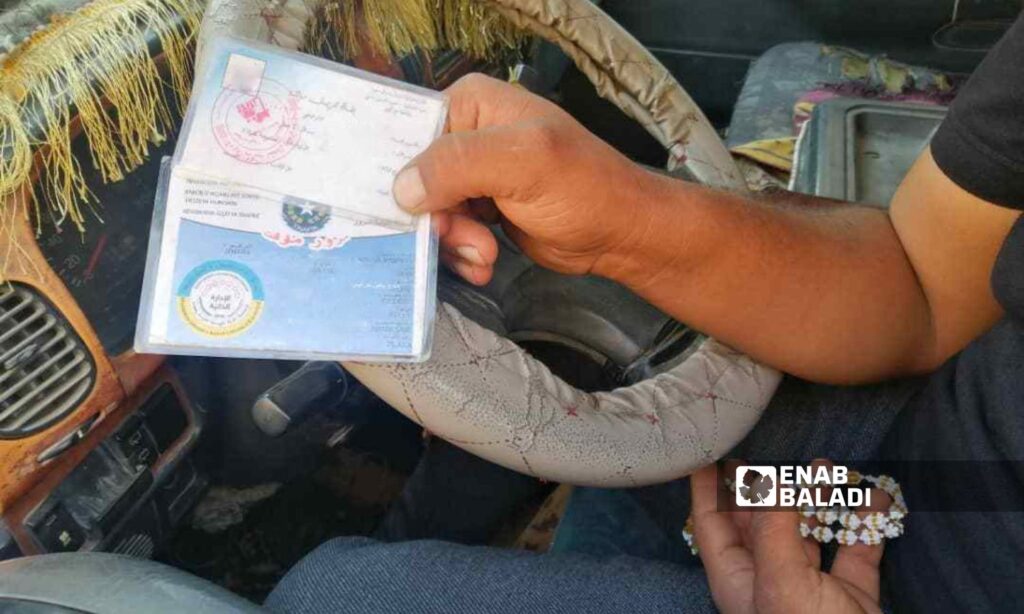Deir Ezzor – Obadah al-Sheikh
Alaa al-Rawi lost her identification card after escaping from the al-Hol camp in northeastern Syria, where she was displaced as a result of the battles between the Islamic State group and the Kurdish-led Syrian Democratic Forces (SDF).
Al-Rawi was later forced to leave her ID withheld inside the camp, which restricted her freedom of movement after leaving the camp and deprived her of access to basic services.
She was not the only case in the eastern region, as civilians in Deir Ezzor also suffer from the loss of their personal documents for various reasons, which exposes them to many problems, including the difficulty of traveling and moving inside and outside their areas, and the difficulty of obtaining aid from humanitarian organizations.
Al-Rawi told Enab Baladi that she sometimes has to request a Family Book from her neighbors to obtain aid or to conduct official transactions, as the only solution is to go to regime-controlled areas to obtain alternative personal documents, which is outside the scope of her ability.
She has been going to the local council of the Autonomous Administration to help her retrieve her documents from the camp administration, but she has not received a response for four years now.
Complications of losing personal documents
The complexities of losing IDs negatively affect individuals’ lives and their basic rights to access services and assistance and facilitate daily affairs.
Waad, who is from the town of Sousa in the eastern countryside of Deir Ezzor, explained to Enab Baladi that she is facing difficulty in recovering her family’s documents because she is an employee in the Autonomous Administration, which placed her name on the lists of those wanted by the Syrian regime government and prevented her family from going to regime-controlled areas to obtain alternative documents for fear that one of the individuals will be arrested and blackmailed into releasing him.
In the countryside of Deir Ezzor, there is a civil registry to extract personal documents issued by the Autonomous Administration, including personal and family identification certificates and residence permits that enable individuals to move within the eastern governorate.
However, these documents are being scrutinized by military checkpoints, which suspect that they are forgeries.
The SDF’s military checkpoints demand Syrian documents extracted from regime-controlled areas, such as personal identification and family records.
These documents are also the only documents accepted by international and civil organizations for registration for humanitarian aid, which increases pressure on the lives of individuals and hinders their freedom of movement.
Mumin al-Fahd, who was displaced from the town of Subikhan in the eastern countryside of Deir Ezzor, which is under the control of Iranian militias, and now resides in the town of al-Shannan in the same countryside under the SDF-control expressed his dissatisfaction with the challenges he faces with taking away the “expat card” required for those moving between areas under the control of the SDF and the regime.
The SDF controls the areas extending east of the Euphrates River in Deir Ezzor governorate, with the exception of the villages of al-Husseiniyah, al-Salihiyah, Hatla, Marat, Tabiya Jazira, Mazloum, and Khasham, while the Syrian regime controls the areas extending west of the river, and militias loyal to Iran are mainly stationed there.
Obtaining an “expat card” requires submitting personal documents in addition to two guarantors residing in the areas controlled by the SDF, but al-Fahd does not have these documents because he also left the al-Hol camp by smugglers, and he was unable to recover them through the local councils.
If documents are available, the “expat card” is also considered an additional obstacle due to security procedures and delays in issuing it by the responsible authorities.
Incomplete solutions
The head of a local council affiliated with the Deir Ezzor Civil Council confirmed to Enab Baladi that the local council has no role in recovering personal documents that were lost during displacement, given that it does not have the authority to issue official, internationally recognized documents.
The local official, who requested to remain anonymous for security reasons, added that the role of the council is limited to certifying family data recognized by the Autonomous Administration of residents who submit requests to facilitate their work or for various purposes, and these documents are certified by local councils in neighborhoods and are recognized only by military forces and civil councils.
He indicated that the local councils are no longer responsible for issuing personal documents and that the civil registry and the general court in the Kasra region, west of Deir Ezzor, are now the responsible authority.
The right to recognition as a person before the law is a basic human right, and it is a right stipulated in international and Syrian law, but Syrians who have been displaced over the past decade face many obstacles that prevent them from obtaining civil documentation.

